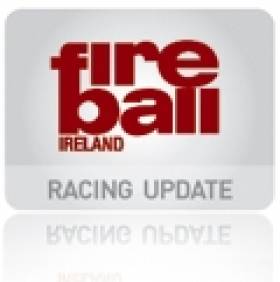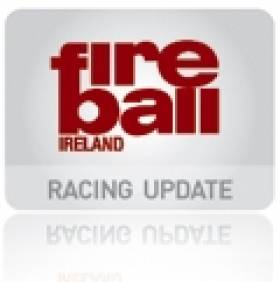Displaying items by tag: Conor Kinsella
#fireball – Barry McCartin and Conor Kinsella have retained the Ulster Fireball Championships trophy after six races over two days in Cushendall. Second were Noel Butler and Stephen Oram and third were Kenny Rumball and Brian Tedz Byrne. Day one of the event saw lively NW winds of 12-18 knots. McCartin/Kinsella posted three wins that day on Olympic Triangular courses. Frank Miller and Ed Butler benefitted from the windy conditions and lay in fourth place overnight with two fourths and a fifth putting them ahead of team Clancy and Niall McGrotty & Neil Cramer. Further back Louise McKenna and Hermine O'Keeffe kept ahead of Mary Chambers and Brenda McGuire and local pairing of James Farrell and Terry Rowan who were sailing their first competitive event in a Fireball. Numbers at the event were disappointing at nine boats when a couple had to drop out at the last minute but for those who travelled it was a really great event.
Day two saw the winds drop a bit lighter and by the time the fleet was afloat it was quite light and a somewhat patchy, north easterly in direction. Race one saw a big shift right on the second beat and Rumball/Tedz came out of this best and led to the finish of the windward-leeward race. Miller/Butler also benefitted from that shift but threw away a second place to team Clancy by not tacking immediately at the final leeward to cover to the finish. The next 2 races took place in similar conditions but there were patches of decent wind; finding them was the trick.
Rumball/Tedz showed their talent for wind sniffing and won the third race. McCartin/Kinsella kept a solid grip on the event with two seconds on day 2 though they got badly caught by the shift in race one leaving them 6th in that discarded race. The Clancys showed better pace on day 2 and pulled ahead of Miller/Butler overall while McGrotty/Cramer didn't achieve their usual form for the conditions. The silver trophy was won by locals James Farrell and Terry Rowan, the latter sailing a Fireball for the first time. Hospitality at the club was remarkable with free food laid on after racing on Saturday night. The setting for the racing could not have been prettier this surely must be one of the nicest places to sail on the island and with the motorway making it less than 3 hours drive from Dublin it's safe to say the Fireball fleet will be back, next time with better numbers.
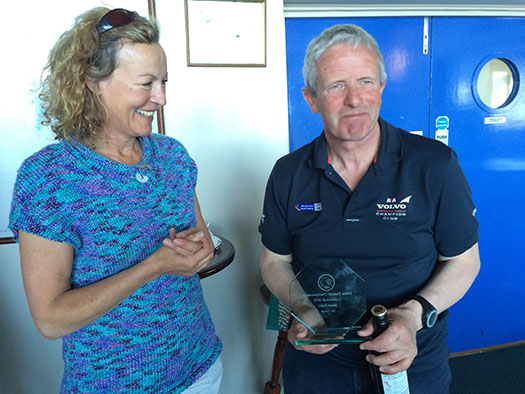
The silver trophy was won by local James Farrell
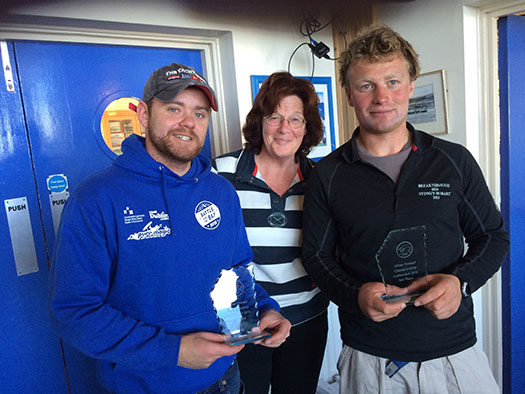
Brian Tedz Byrne and Kenny Rumball were third
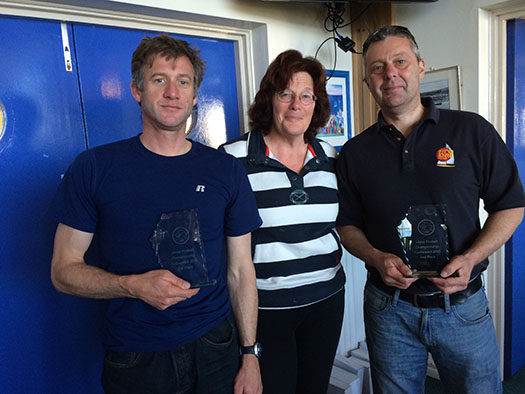
Second were Noel Butler and Stephen Oram
#fireball – Royal St. George Yacht Club Fireball pairing Barry McCartin & Conor Kinsella continue to knock on the door of the international Fireball scene. After a hat–trick of domestic titles, the Dun Laoghaire duo won the pre-Europeans, were fourth at the Europeans in the Shetlands and have just finished fifth at the UK Nationals at Tenby Sailing Club in Pembrokeshire, only narrowly behind a number of pro–teams.
With the event already in the bag for Tom Gillard & Richard Anderton, the final day could have been an anticlimax and in terms of the podium places it probably was. However the Fireball Nationals always offers more, and with prizes to play for across the fleet there was plenty of action in the last 2 races.
Race 9 got underway on a gate start in a fresh Northerly breeze around 13 knots. Ian Dobson & Tim Linsell got off to a flyer and in lovely sunny conditions they went on to take a well deserved race win.
For the final race of the series the wind freshened just before the start and the fleet enjoyed some champagne Fireball conditions to end the week. Gillard & Anderton displayed the form they had shown throughout and won it from Dobson & Linsell, with the Irish duo Barry McCartin & Conor Kinsella getting a well deserved 3rd. In the Silver fleet, Simon Lomas-Clark and Rob Daniels had an absolute flyer, carding a seventh to bring them within one point of a fleet win. Oh so close!
FInal top five, gold fleet:
1. Tom Gillard & Richard Richard Anderton
2. Ian Dobson & Tim Linsell
3. Matt Burge & Simon Wheeler
4. Dave Wade & Tim Hartley
5. Barry McCartin & Conor Kinsella


























